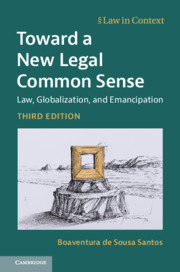Book contents
- Toward a New Legal Common Sense
- The Law in Context Series
- Toward a New Legal Common Sense
- Copyright page
- Dedication
- Contents
- Preface to the Third Edition
- Preface to the Second Edition
- Acknowledgements
- 1 The Tension between Regulation and Emancipation in Western Modernity and Its Demise
- 2 Toward an Oppositional Postmodern Understanding of Law
- 3 Legal Plurality and the Time-Spaces of Law: The Local, the National, and the Global
- 4 The Law of the Oppressed: The Construction and Reproduction of Legality in Pasargada
- 5 Globalization, Nation-States, and the Legal Field: From Legal Diaspora to Legal Ecumenism?
- 6 Law and Democracy: The Global Reform of Courts
- 7 On Modes of Production of Social Law and Social Power
- 8 Law: A Map of Misreading
- 9 Can Law Be Emancipatory?
- Postface as Disquietude
- Bibliography
- Index of Names
- Index of Subjects
7 - On Modes of Production of Social Law and Social Power
Published online by Cambridge University Press: 08 October 2020
- Toward a New Legal Common Sense
- The Law in Context Series
- Toward a New Legal Common Sense
- Copyright page
- Dedication
- Contents
- Preface to the Third Edition
- Preface to the Second Edition
- Acknowledgements
- 1 The Tension between Regulation and Emancipation in Western Modernity and Its Demise
- 2 Toward an Oppositional Postmodern Understanding of Law
- 3 Legal Plurality and the Time-Spaces of Law: The Local, the National, and the Global
- 4 The Law of the Oppressed: The Construction and Reproduction of Legality in Pasargada
- 5 Globalization, Nation-States, and the Legal Field: From Legal Diaspora to Legal Ecumenism?
- 6 Law and Democracy: The Global Reform of Courts
- 7 On Modes of Production of Social Law and Social Power
- 8 Law: A Map of Misreading
- 9 Can Law Be Emancipatory?
- Postface as Disquietude
- Bibliography
- Index of Names
- Index of Subjects
Summary
In this chapter I present a new theoretical proposal based on the distinction among several modes of production of law that operate in society in articulation with as many modes of production of power and knowledge. The main features of this framework are the following. Capitalist societies within the world system are constituted by six structural places, six basic clusters of social relations, which define the horizon of relevant determination. This horizon establishes both outer limits and possibilities, thereby allowing for a minimalist order, a chaos-friendly order, an ordering principle that operates through complexity, fragmentation, hybridization and, above all, through constellation. My argument is that the political character of social relations of power does not lie in one particular form of power, namely citizenplace power (domination), but rather in the aggregate power resulting from the constellations among the different forms of power in different social fields. Similarly, the legal character of social relations of law does not derive from one single form of law, namely from citizenplace law (state law), but rather from the different constellations among different forms of law. Finally, the epistemological profile of social relations is not provided by one specific epistemological form, namely the epistemological form of the worldplace (science), but rather by the different constellations of knowledges that people and groups produce and use in concrete social fields.
- Type
- Chapter
- Information
- Toward a New Legal Common SenseLaw, Globalization, and Emancipation, pp. 420 - 495Publisher: Cambridge University PressPrint publication year: 2020



